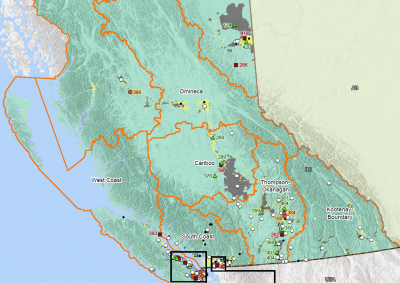Provincial Groundwater Observation Well Network Review
Client
British Columbia Ministry of Environment & Climate Change Strategy
Location
British Columbia
Project Duration
December 2019 – May 2020
Background
The British Columbia (BC) Ministry of Environment and Climate Change Strategy operates the Provincial Groundwater Observation Well Network (PGOWN) which collects, interprets and reports information about groundwater quantity and chemistry in the Province. Groundwater data is used by provincial government staff, private consultants, environmental researchers, other government agencies, community groups, water suppliers and many other users to assess trends in groundwater levels and chemistry in various aquifers across BC. To ensure optimum observation well data and information from relevant sampling sites is available in a timely manner it is essential that the network be reviewed periodically and continuously improved.
Services Provided
The main scope and objectives of Hatfield’s 2019 PGOWN review were to: (1) undertake a brief review of groundwater monitoring networks in other jurisdictions to inform general approaches for monitoring network design and optimization, (2) review, analyze and interpret active PGOWN groundwater level and chemistry data, and (3) develop a methodology, with standardized criteria, to review active PGOWN wells and prioritize the placement of future PGOWN wells throughout the Province.
As outcomes of the project, Hatfield concluded that the PGOWN provides meaningful data to support the assessment of groundwater level trends, water type characterization and identifying major water quality issues (e.g. chloride or nitrate exceedances of BC water quality guidelines or Canadian Drinking Water Guidelines), with the latter correlating well with water quality concerns for the respective aquifers (i.e. saline intrusion, regional nitrate concerns). It was recommended to organize and formulate PGOWN groundwater level monitoring objectives more unambiguously. It was also apparent that water quality data analysis is an under-used objective for the monitoring network. Two existing observation wells were recommended to be decommissioned while the remaining observation wells were recommended to be continued. Detailed recommendations for new monitoring locations in each of the main management regions (West Coast, South Coast, Okanagan-Kootenay, Cariboo Thompson, Omineca-Peace and Skeena) were also provided. The Ministry found the review report to be very useful and they are working on determining which recommendations will be implemented and on what timelines.
